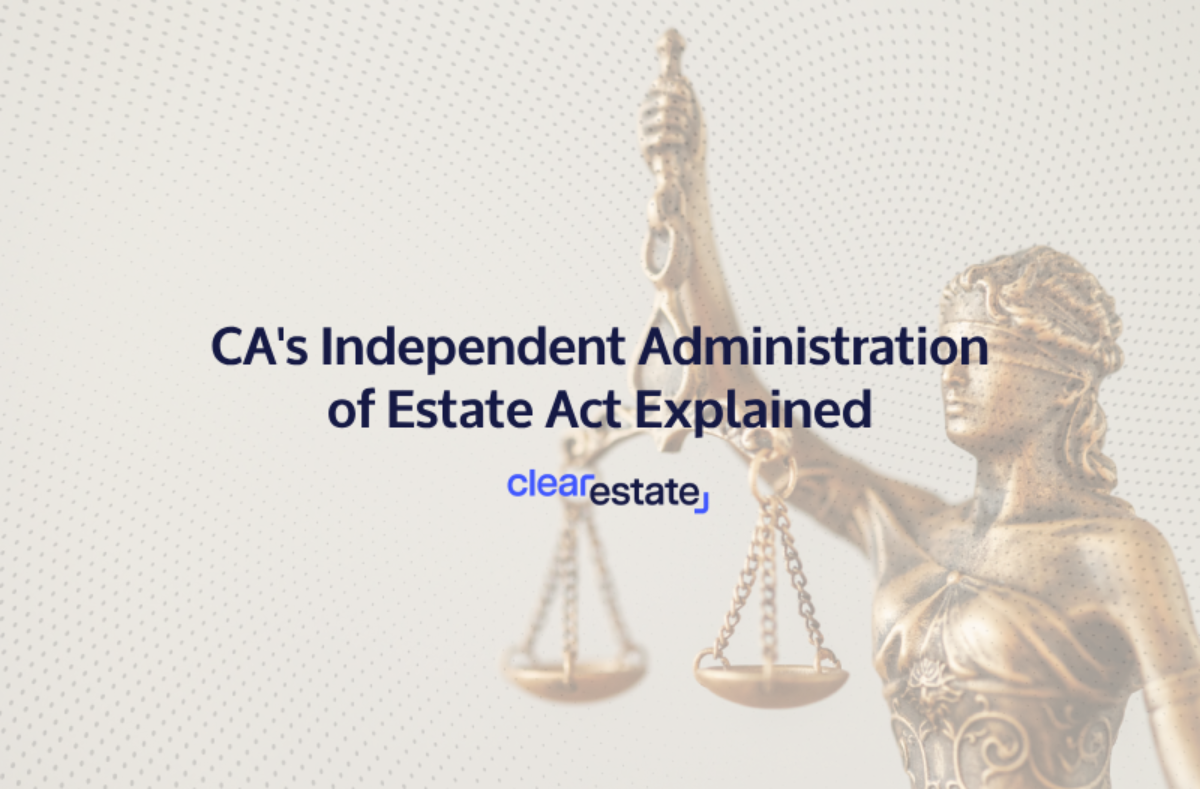Estate Settlement
May 01, 2025
What to Do When Someone Dies in California
Follow this step-by-step guide to navigate legal duties, probate, and estate tasks with clarity and confidence.
Explore CA's IAEA: Full vs. limited authority, court-free actions, and notice requirements. Learn how to expedite probate and when the Act doesn't apply.


The Independent Administration of Estates Act, outlined in California Probate Code Sections 10400-10406, is a series of laws designed to expedite and simplify the probate process. This act empowers estate administrators, also known as personal representatives, to manage most aspects of a decedent's estate without constant court supervision.
The IAEA is particularly beneficial for straightforward estates where beneficiaries are in agreement about the distribution of assets. By granting the personal representative more autonomy, the act can significantly reduce the time and complexity typically associated with probate proceedings.
The authority to administer an estate under the IAEA isn't automatically granted to everyone. Eligible individuals who may petition the court for this authority include:
📌 Important: While these individuals may be eligible, the court ultimately decides whether to grant IAEA authority. This decision is typically made when probate proceedings begin but can also occur at any point during the probate process.
It's worth noting that the decedent's will may explicitly grant IAEA authority to the named executor. However, if the will prohibits the use of IAEA, or if an interested party provides the court with a compelling reason why the estate should not be administered under IAEA, these provisions will be respected.
When petitioning for powers under the Independent Administration of Estates Act (IAEA), personal representatives have two options: "full authority" or "limited authority." Each grants different levels of autonomy in managing the estate.
| Authority Type | Powers Granted | Real Property Transactions |
|---|---|---|
| Full Authority | All powers under IAEA | Can sell, exchange, or grant options on real property |
| Limited Authority | Most IAEA powers | Cannot perform real property transactions |
📊 Key Difference: The main distinction lies in the ability to handle real property transactions without court supervision.
Regardless of whether full or limited authority is granted, the IAEA empowers personal representatives to perform various actions without seeking court approval for each individual task. These powers are detailed in Probate Code §§ 10550–10564.
| Action Category | Specific Powers |
|---|---|
| Financial Management | • Pay taxes and administrative expenses<br>• Sell listed securities |
| Property Handling | • Make repairs or improvements<br>• Sell perishable or depreciating property<br>• Accept deed in lieu of foreclosure |
| Claims Management | • Allow, pay, reject, or contest claims against the estate |
Some actions, while not needing court approval, do require the personal representative to provide prior notice to affected beneficiaries.
This notice, known as the Notice of Proposed Action (Form DE-165), must be given at least 15 days before the proposed action.
💡 Pro Tip: Beneficiaries can waive their right to receive Notice of Proposed Action using Form DE-166, potentially expediting estate administration.
While the Independent Administration of Estates Act (IAEA) offers significant advantages in estate management, it's crucial to understand its limitations and potential exceptions.
There are specific circumstances where the IAEA cannot be used or may be restricted:
| Scenario | Outcome |
|---|---|
| Decedent's will prohibits IAEA use | IAEA cannot be used |
| Interested party provides good cause against IAEA use | Court may restrict or prohibit IAEA use |
| Court imposes restrictions on administrator's powers | IAEA powers may be limited |
Even with full IAEA authority, certain actions always require court approval:
Exception: These restrictions don't apply if you're the sole beneficiary or have consent from all known beneficiaries.
When selling real estate for cash under IAEA, the court may require a bond unless:
📌 Key Point: The bond serves as a form of insurance to protect the estate's assets.
If IAEA cannot be used, the estate can still go through probate, but with more court involvement:
| Action | Procedure Without IAEA |
|---|---|
| Paying creditors' claims | Submit original claim and copy to court for approval |
| Selling real property | Requires special documents and procedures (not covered in this guide) |
🕒 Time Consideration: Non-IAEA probate typically takes longer due to increased court oversight.
The Independent Administration of Estates Act (IAEA) significantly streamlines estate management in California by:
However, the IAEA has limitations:
Understanding these factors is crucial for efficient estate administration under California law.
Navigating the IAEA and probate process can be challenging. Our estate settlement professionals can help you leverage the IAEA effectively for your specific situation.
Book Your Free Estate Administration Consultation Now
Let our experts guide you through the probate process and maximize the benefits of the IAEA for your estate.
 Simplify Probate Today
Simplify Probate Today
Get expert guidance from our specialists who've helped 10,000+ families.
Book a free consultation